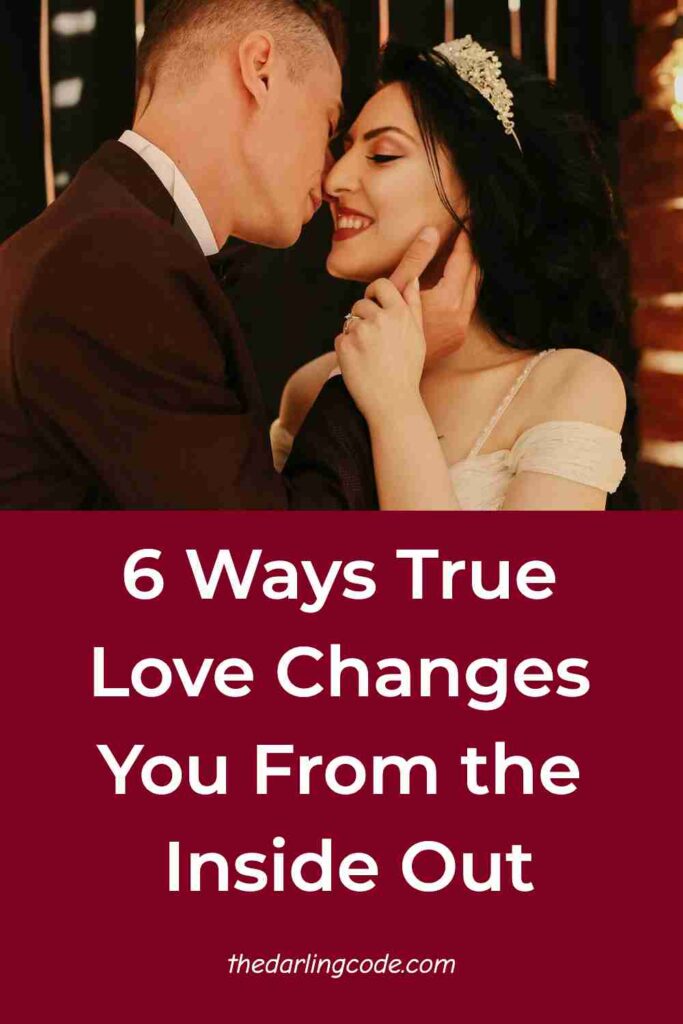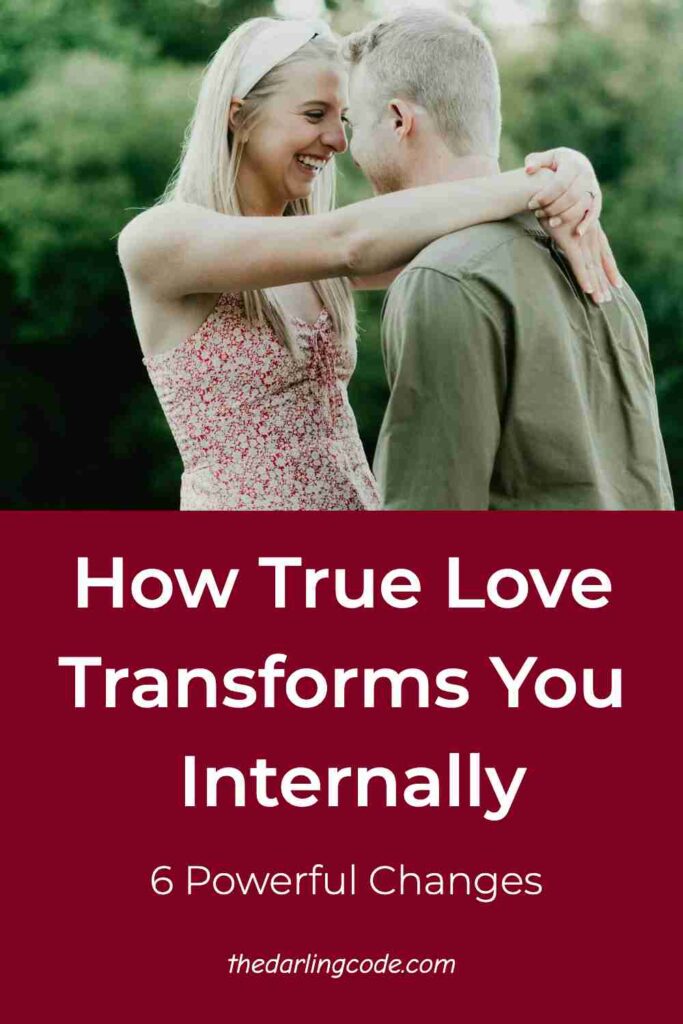How True Love Changes You From The Inside Out
The experiences shared in this article are based on real emotional journeys, but all personal details are anonymized and used with the explicit written permission of the clients. Any resemblance to actual persons, living or dead, is purely coincidental. We are committed to treating all client stories with the utmost confidentiality and respect.
Let’s start with a messy Tuesday. You know the kind: You spill coffee on your last clean blouse, forget your phone charger, and realize halfway to work that you left the stove on.
But then your partner texts you—“Saw the doughnuts you like at the bakery. Saved you the maple-glazed one”—and suddenly, the chaos softens.
True love doesn’t erase life’s messes, but it shifts how you carry them.
I’ve spent years guiding people through the thorny garden of relationships.
Whether it’s a client sobbing into her latte at my favorite café or a 3 AM email from someone who can’t stop replaying a fight with their partner, one truth emerges again and again: Real love isn’t about grand gestures.
It quietly rewires your nervous system, your habits, even your grocery list.
People in secure relationships report less stress during life’s daily hiccups—not because their partners “fix” problems, but because love becomes an emotional anchor.
The magic? It starts with you, not them.
Save this article for later—Pin it to Pinterest and come back when you need it! 📌

Your Brain on Love: More Than Just Butterflies
When I first met Jenna, she described her relationship as “a rollercoaster with a broken seatbelt.” She’d swing between clinging to her partner and pushing him away, terrified of losing herself. Sound familiar? Here’s what we worked on—and what science backs up:
- Love Builds New Neural Pathways
Romantic love activates the same brain regions as addiction (yes, really). But healthy love? It lights up areas linked to empathy and long-term planning. Practically, this means rewiring requires consistency. Example: If your knee-jerk reaction is to shut down during conflict, try this: Next argument, pause and say, “I want to understand. Can we slow down?” It’s not about winning—it’s about building a new habit of connection.Jenna started practicing this with her partner. At first, it felt awkward. But after three weeks, she noticed something: “I didn’t storm out once. He actually listened when I stayed calm.” - Your “Alarm System” Gets an Upgrade
A client once told me, “I didn’t realize how much rage I carried until my partner stayed calm during my meltdown.” Secure love teaches your body safety. Practical tip: Use the “5-Second Rule” before reacting. Breathe in for 5 seconds, exhale for 7. It’s not woo-woo—it’s basic physiology to quiet your fight-or-flight response. - The Forgotten Superpower: Boredom
New Addition:
Love isn’t all passion and fireworks. One of my clients, Mark, thought his 5-year marriage was “fizzling out” because they’d replaced date nights with spreadsheet talks. But here’s what we uncovered: Their quiet Tuesday routines—making pancakes, debating whether to binge The Crown or Succession—were building a deeper trust. Research shows couples who embrace mundane moments report higher long-term satisfaction. True love thrives in the unremarkable.
When Love Makes You Face Your Ugly Bits
One fall afternoon, a client—let’s call her Alyssa—sat cross-legged on my couch, tears streaming. “Why do I keep dating emotionally unavailable people?” she asked. Her voice cracked. “Am I broken?”
Here’s what I told her (and what I’ll tell you):
True love holds up a mirror.
Alyssa wasn’t broken. But her pattern revealed a deep-seated belief: “If I’m too much, they’ll leave.” Together, we dug into her self-talk. For every critical thought (“I’m too needy”), we wrote a counter-message (“My needs are valid”). She taped them to her bathroom mirror. Fast forward six months: She canceled a Thanksgiving engagement to someone who dismissed her feelings. Now? She’s dating someone who texts, “Tell me why today was hard—I’m here.”
Key takeaway: Love doesn’t fix you. It shows you where healing is needed.
How to start your own “mirror work”:
- For one week, journal every time you feel unworthy in your relationship.
- Ask: “Is this my fear talking, or is this person actually dismissing me?”
- Share one vulnerability with your partner that you’ve bottled up. Example: “I felt hurt when you joked about my cooking. Can we talk about it?”
The Quiet Power of Being Seen
My own “aha” moment happened years ago. Picture this: My husband and I fighting over whose turn it was to clean the cat litter. (Romantic, right?) But underneath, I was seething: “Why doesn’t he notice how exhausted I am?” The next day, he walked in with a thermos of my favorite chai and said, “Let’s figure out a chore schedule. This isn’t working for either of us.”
That tiny moment changed everything. He saw past my snappiness to my burnout. True love turns ordinary moments into trust-building rituals.
What you can do today:
- Create a “We Noticed” list: Jot down 3 small things your partner did this week that made your life easier. Share it over coffee.
- Try the “7-Question Reset” during tension:
- “What do you need right now?”
- “What did I misunderstand?”
- “How can I support you better?”
Love in the Gray Areas
Not every story has a Hallmark ending. Sarah, a client in her 40s, fell for a divorced dad who wasn’t ready to commit. “It feels right, but… does ‘meant to be’ even exist?” she asked.
Here’s my non-answer answer: True love isn’t about destiny. It’s about alignment.
We mapped her non-negotiables: emotional availability, shared values, mutual effort. By month three, she realized: He couldn’t meet her halfway. Letting go wasn’t failure—it was honoring her worth. She emailed me later: “It hurt, but I finally get what you mean by ‘self-respect isn’t selfish.’”
Advice for messy, in-between love:
- Beware of “one day” promises (“He’ll change after the promotion…”). Focus on now.
- Name your “sacred yeses”: What will you always prioritize? (E.g., honesty, kindness to yourself)
New Addition: The “Breadcrumb” Trap
Another client, Maya, dated someone who’d text “Thinking of you <3” after weeks of silence. “It felt like crumbs,” she said. We designed her “Full Plate Test”: If someone only offers crumbs 80% of the time, you’re allowed to want a full meal. She stopped replying to late-night “U up?” texts. Six months later? She met a teacher who planned entire picnics—cheese, wine, the works—just because.
Love as a Language (And How to Speak It)
New Section
A couple I worked with—Elena and Danny—argued constantly about texting habits. She wanted daily check-ins; he found them suffocating. Neither was wrong—they just spoke different love dialects.
Try this framework to decode your patterns:
- Identify your “core language”: What makes you feel loved? Acts of service? Affection? Shared projects?
- Ask for translations: “When I surprise you with coffee, that’s me saying ‘I love you.’ How does that land for you?”
- Compromise ≠ sacrificing: Elena agreed to fewer texts if Danny initiated a weekly “no-phones” walk.
When Love Feels Heavy: Permission to Rest
New Section
During a brutal winter a few years back, my husband lost his job. We couldn’t afford date nights, so we transformed our tiny apartment into a “cozy fortress”—blankets, cheap wine, and a Lord of the Rings marathon. Love didn’t solve our financial stress. But it turned survival mode into teamwork.
Your “We’re in a rough patch” toolkit:
- Name the elephant: “This isn’t how I pictured things either. Let’s just… be stuck together for now.”
- Micro-moments matter: A 2-minute hug, leaving sticky notes with inside jokes.
- Outsource solutions: Friends, family, or a guidance.
Final Words from The Darling Code
True love isn’t about becoming someone else’s “better half.” It’s about expanding into your whole self, scraped knees and all. If you take one thing from this, let it be:
Start small.
- Tonight, write down three moments this week when you felt truly you—the you that laughs at your own jokes, cries at dog rescue videos, or dances in the kitchen. That’s the person worth loving.
- Text a friend: “Name one thing you’re proud of about yourself today.” Watch how it shifts the conversation.
You don’t need permission to want love that leaves you softer, braver, and more yourself.
With heart,
The Darling Code
PS: Save this to your Pinterest “Growth” board for days when love feels heavy. Today’s actionable step? Stand in front of a mirror and say aloud: “I am allowed to take up space.” Then go drink some water—hydration counts as self-love too.
Got value from this article? Pin it to Pinterest for easy reference and help others discover it! 🌟


ABOUT THE AUTHOR
Carsey, Founder, Editor-in-Chief & Relationship Coach
Carsey is the heart and mind behind this space. As a Relationship Coach and Editor-in-Chief, she blends practical advice with storytelling to help you navigate love, connection, and everything in between.






